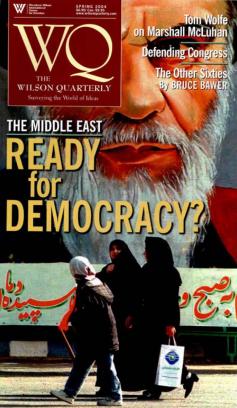The Middle East: Ready for Democracy?


In search of the right prescription for smart urban growth.
In America, civil religion blends the religious and the secular in a sometimes uneasy union.
The notion that the Supreme Court holds judicial supremacy is a hallowed American tradition...and a mistaken one, according to one law professor.
Does the "bully pulpit" of the presidency really influence public opinion?
There are sound reasons for the United States to seek European backing for its foreign policies, despite transatlantic differences.
By relying on the Patriot, American armed forces have "only half a missile defense," according to one observer.
The connection between poverty and terrorism is popular, but mistaken.
The Protestant Ethic notwithstanding, regular church attendance appears to be a statistical drag on a country's economy.
Old-fashioned piracy on the high seas was virtually extinguished in the early 19th century, but it is making a troubling comeback, particularly in the Far East.
Casinos are often touted as creators of new jobs, but it is not necessarily local workers who will fill them.
The introduction of horses forever altered the Plains Indian societies, and not always for the better.
Getting kids "off the streets" seems to deter property crime, but may help increase the incidence of violent crime.
Marketers have uncovered a valuable tool in selling to the youth market: the kids themselves.
The feminist movement is supposed to be over, but not according to the majority of surveyed women.
When it comes to religion, most journalists seem clueless.
Ed Murrow became director of the United States Information Agency in 1961 with idealistic hopes of telling the truth about America.
Revisionist archaeologists are casting doubt on the glorious past of Israel depicted in the Bible, but one scholar deems their findings "fragile."
Emotion and spirit seem to hold more sway among American Protestant adherents than creed and doctrine.
Some "obsolete" technologies just refuse to die.
Protecting endangered wildlife depends first on deciding what wild means.
Are your country's laws keeping you from having a baby? Come visit us!
Open access academic journals seem like a godsend to cash-strapped libraries, but it's still unclear who will foot the bill.
Richard Rodgers wrote some of the most melodic and inventive popular music of the 20th century, yet throughout his life he remained an unhappy, troubled man.
Antonin Dvorák's time in America produced some of his most enduring music, yet he failed at the purpose for which he had come.
The face was once thought to be a mirror of the soul--an idea widely explored in literature. But modern perceptions seem to differ.
America's vital ally in the Middle East is gripped by myriad societal tensions.
Did Henry Kissinger engineer the coup d'état that toppled Salvador Allende?
The uncertain legacy of the Nobel Prize-winning Austrian economist, F. A. Hayek.
A new book attempts to create some rules for sound urban design.
REPORT FROM A PARISIAN PARADISE: ...
LONE STAR LITERATURE: ...
GODARD:
A Portrait of the Artist at Seventy.
By Colin MacCabe. Farrar, Straus & Giroux. 432 pp. $25
FAITH-BASED INITIATIVES AND THE BUSH ADMINISTRATION: ...
THE HAPPINESS PARADOX.
By Ziyad Marar. Reaktion Books. 08 pp. $19.95
THE PURSUIT OF HAPPINESS IN TIMES OF WAR.
By Carl M. Cannon. Rowman &
Littlefield. 331 pp. $24.95
EUROPE'S LAST SUMMER: ...
FROM JIM CROW TO CIVIL RIGHTS: ...
THE SIBERIAN CURSE: ...
LOVE ONLINE: ...
ONE NATION UNDER GOODS: ...
THE RETREAT OF THE ELEPHANTS: ...
THE PURSUIT OF PERFECTION: ...
Democracy's stunning advance has bypassed the Islamic world.
The Arab world's liberal tradition.
In fighting for their own rights, women in the Middle East are broadening the democratic space in society as a whole.
The 1960s are remembered as a time of upheaval in America. But those subversive "Sixties" aren't the whole story.
Marshall McLuhan (1911–80) was an unlikely prophet of the information age. One of those who first saw the truth in the vatic pronouncements of this obscure academic was a talented young journalist named Tom Wolfe, who helped champion McLuhan’s ideas in the 1960s. Here, Wolfe reflects on the unexpected sources and continuing impact of McLuhan’s vision.
According to opinion polls, Congress is one of the least esteemed institutions in American life. While that should come as a shock, today it’s taken for granted. What can’t be taken for granted is the health of representative democracy amid this corrosive—and often unwarranted—distrust of its central institution.
Democratizing the Middle East may bring a different set of problems to a troubled region.